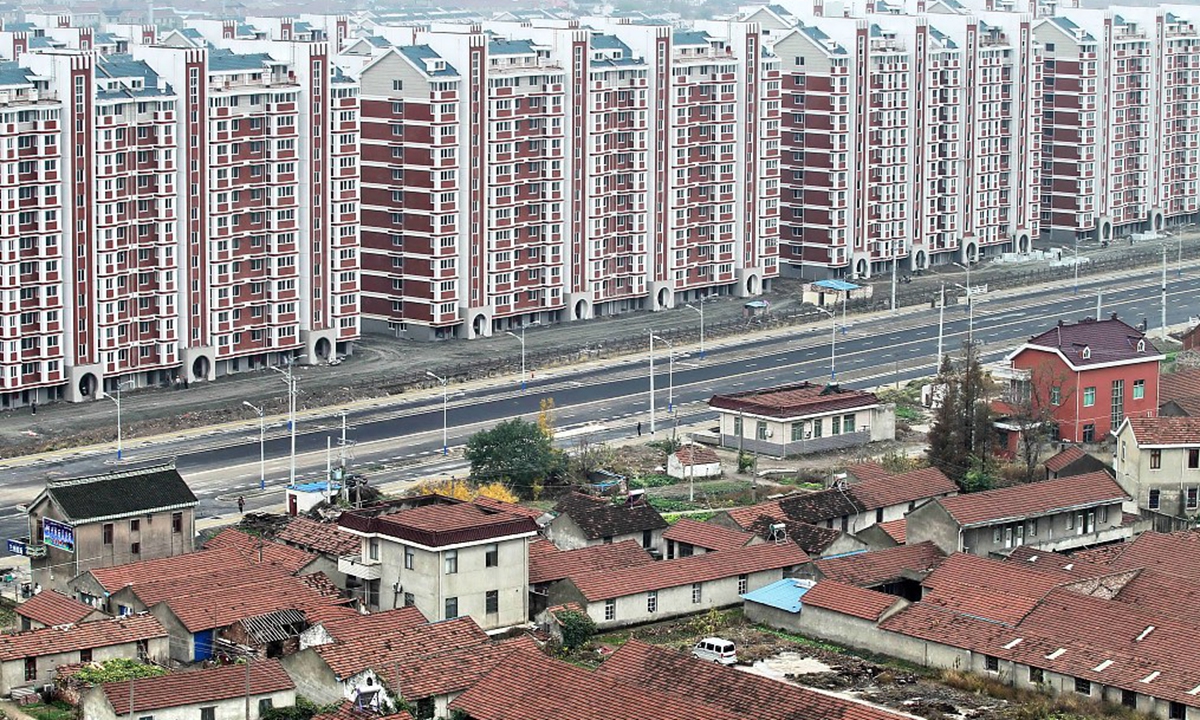
Potential homebuyers look at a property model in Huai'an, Jiangsu province.Photo:Xinhua
China's top financial regulators announced on Thursday the creation of a management system that imposes ceilings on property loans by banks, in a major move to control real estate investment and curb housing speculation that risks destabilizing the financial system.
The property lending concentration management mechanism is a significant move that aims to improve the country's macro-prudential policy and its long-term mechanism for property financial management, read a joint announcement by the People's Bank of China (PBC), the country's central bank, and the China Banking and Insurance Regulatory Commission (CBIRC).
The new regime, effective Friday, is intended to increase the resilience and stability of the financial system and improve the credit structure of banks, boding well for a stable, healthy property market and a balanced development between the financial, property sectors and the real economy, PBC and CBIRC said in the announcement.
Under the new system, the country's banking financial institutions (not including their overseas branches) are categorized into five groups by the maximum ratios allowed for their property loans and personal mortgage loans.
Large Chinese-invested banks (including the Industrial and Commercial Bank of China, China Construction Bank, Agricultural Bank of China, Bank of China, and Bank of Communications) are amongst the first-tier lenders with their outstanding property loans as a percentage of total outstanding yuan loans capped at 40 percent and the upper limit on their extension of personal mortgage loans set at 32.5 percent.
In the case of the lowest-tier village banks, the ceiling for their property loans is set at 12.5 percent and their mortgage loans are capped at 7.5 percent of total yuan loans.

Housing market Photo:VCG
The new mechanism indicates regulatory efforts to prevent risks in the financial and property markets, steadying the two markets, said Xia Dan, a property analyst with the Bank of Communications.
"The strengthening of property financial supervision is a link in the chain to hold onto the set principle of 'housing is for people to live, not for speculation,'" she explained, adding that it helps prevent housing market risks from extending into the financial arena and thus becoming conducive to financial system steadiness.
Banks that had ratios in excess of no more than 2 percentage points of the ceilings by the end of December will be given a two-year transitory period beginning Friday to overhaul their businesses, while those reporting ratios that overstepped the ceilings by over 2 percentage points have four years to remake their businesses, said a statement on CBIRC's website detailing the arrangement.
The banks are ordered to submit their overhaul plans to the financial regulatory authorities within one month.
The fresh property curb is part of broad efforts by Beijing to render the banking sector a genuine lifeline for the economy, especially for coronavirus-affected smaller businesses, Chinese observers said.
In his New Year address, PBC governor Yi Gang revealed that Chinese banks have postponed taking interest and principal payments on over 6 trillion yuan ($918 billion) loans, cumulatively extended inclusive loans for small- and micro-sized businesses totaling over 3 trillion yuan, supported 30 million-plus business entities, and achieved the goal of contributing 1.5 trillion yuan in profits to the real economy.
Industry watchers have appraised the regulatory strengthening in their outlook for the country's real estate sector.
The marketplaces for new and pre-owned homes will remain flat in 2021 compared with last year as measured by transactions, and pre-owned home prices are projected to record a rise of about 5 percent in 2021 from a 7 percent gain this year, a research institute of major Chinese real estate platform Ke.com revealed in a report, foretelling an end to broad-based gains in home prices.
Home prices in the Yangtze River Delta region will maintain a mild spike in 2021, and the housing market in the Pearl River Delta region is likely to see signs of cooling as a consequence of tightening measures, while other non-core cities are more likely to embrace a cooling market, the report forecast.
Global Times





